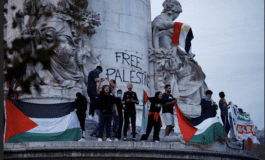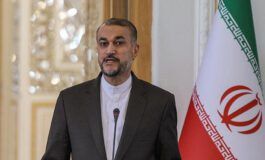
Palestinian ambassador calls for non-violent resistance movement, discusses peace prospects
TUCSON — The Palestinian ambassador to the United States said Palestinians should move toward a non-violent resistance movement in the Occupied Territories, even as latest reports reveal Israel does not intend to halt its settlements in the West Bank and East Jerusalem.
Ambassador Afif Safieh addressed a crowd of about 80 at the University of Arizona in Tucson Friday evening, about the need for more diplomatic U.S. and international presence in the Israeli-Palestinian peace process, in light of the Israeli and Palestinian factors disrupting it.
Israel would be less inclined to use its F-16s and Apache helicopters in repressing a non-violent Palestinian movement, which would in turn give America more of a reason to support it, he said.
“We are a society condemned to resist,” Safieh said. “But I’m in favor of converting towards popular non-resistance. If I want to defy Mike Tyson, I’d better not invite him to the boxing ring.”

|
| Israeli settlements |
“Israel often says it does not have a Palestinian partner for peace, but we the Palestinians believe we do not have an Israeli partner for peace,” he said, citing Israel’s settlement buildings, security checkpoints, failure to fulfill its promise of releasing Palestinian political prisoners and its “Wall of Shame,” being built near the northern part of the pre-1967 “Green Line” between Israel and the West Bank, as examples.
“Sharon and Olmert’s Wall of Shame, which (former U.S. President Jimmy) Carter calls an apartheid wall and Bush has said snakes deep into Palestinian land, is swallowing up 12 percent of the West Bank,” Safieh said, adding that Israel does not intend to give back the Jordan Valley and the shore of the Dead Sea, accounting for another 30 percent of the West Bank.
“Israel’s successive governments still want to acquire as much of the Palestinian geography as possible with as little of our demography as possible,” he said, adding that the Palestinians have been “unreasonably reasonable,” in what they are willing to accept for a future state.
His criticism however, was not reserved for Israel as the ambassador, a Fatah loyalist, spoke in length about what he called “HAMAS’ blunders,” mainly its support of a one-state solution.
“Hamas needs to do some soul-searching and it should be encouraged to revise its philosophy of armed resistance,”he said, blaming the current three-state situation on HAMAS’ refusal to negotiate.
However, for as much as Safieh criticized HAMAS, he pointed out the need for Fatah, Israel and the U.S. to work with it in order to create peace.
“In a democracy the last election is not the last election, so I did not understand why all hell broke loose in Washington (after HAMAS’ election in Feb. 2006),” he said, adding that “HAMAS is not a monolithic movement.”
The U.S. and Israel missed the opportunity to positively sway the direction of political Islam by refusing to accept the Palestinian government that was agreed upon at the Mecca talks in Feb. 2007, he said.

The failure to do so resulted in HAMAS’ control of Gaza the following June, he said.
The U.S. and the international community need to play a viable role in any future peace process because too much emphasis has given to the local, confrontational actors, he said.
“The battle for (Palestinian) statehood will be made in Washington D.C.,” he said.
After his speech, the floor was opened to audience questions, which were mainly written on paper and passed to the ambassador.
One question asked the ambassador which candidate he supported in the U.S. political election.
Earlier in his speech Safieh said he was a democrat, but said he couldn’t directly name the candidate he supports, although audiences may have picked up the hint in his response:
“I believe we are witnessing an unearthing of American idealism, and I am not unhappy to see it resurrect and manifest itself in this election.”
Christian Sinclair, the assistant director of the UA’s Center for Middle Eastern studies, said Safieh’s visit is in-line with the center’s philosophy of encouraging students to think critically about issues in the Middle East, without prejudice.
“If you don’t know about the Middle East, you tend to lump its citizens in the category of ‘other,’ ‘ he said. “Having students hear the ambassador speak, seeing his sense of humor, it really humanizes the conflict… I mean some students didn’t even know Palestine had an ambassador.”
Safieh, a Christian born in Jerusalem in 1950, was educated in Paris and worked with the Palestine Liberation Organization before serving as the official delegate to the United Kingdom, and then the Vatican. He was appointed as the official representative of the PLO to the United States in October 2005.
Safieh’s three-day trip to Tucson was sponsored by the American-Arab Anti-Discrimination Committee, ADC Tucson and Middle East Justice Now! to commemorate Palestine’s Day of the Land and raise funds for Friends of the Palestinian Medical Relief Society.





Leave a Reply